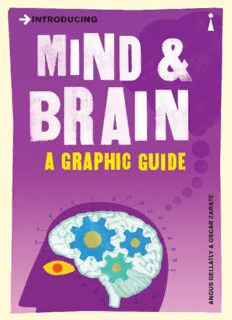
Introducing Mind and Brain PDF
Preview Introducing Mind and Brain
Published by Icon Books Ltd, Omnibus Business Centre, 39–41 North Road, London N7 9DP Email: [email protected] www.introducingbooks.com ISBN: 978-178578-314-2 Text copyright © 1998 Angus Gellatly Illustrations copyright © 2013 Icon Books Ltd The author and illustrator have asserted their moral rights Originating editor: Richard Appignanesi No part of this book may be reproduced in any form, or by any means, without prior permission in writing from the publisher. Contents Cover Title Page Copyright Mind and Brain: a Brief History Inventing the Mind What is the Mind? Meet the Brain Matter or Spirit? Pioneer Map-Makers The Mind of the Gaps Ventricles, Tissues and the Mind A Fish Called Wondercure Bumps on the Head The Beginning of Localization Beginning to Assemble Brain Functions Tracing the Progress Neurons and Glia Grey and White Matters The Electric Brain Abnormal Firing The Chemical Brian Chemical Malfunctions Brain, Hormones and Body The Geography of the Human Brain Evolution and Development The Hindbrain The Midbrain The Forebrain Left and Right Hemispheres (LH and RH) Mental Abilities Simple Minds 1: the Sea Slug Simple Minds 2: Frogs and Toads Simple Minds 3: Birds Simple Minds 4: Human Beings Complex Minds and Computers Language and the Brain Disorders of Language: the Aphasias A Model of Language Use Language and All the Brain Language, Interpretation and Action Movement and Mind Tuning the Movements Two Motor Movement Control System Levels of Control of Movement The Motor System Damage to the Motor System The Origins of Voluntary Movement Proprioception and Body Ego Smells and Emotions Emotional Reaction The Anatomy of Fear Fearful Symmetry Sub-cortical Learning Knowing When to be Afraid Emotions “Left and Right” Emotional Tone Emotion and Reason Emotions Involved in Decisions Memory Makes You Flexible What Amnesia tells us about Mind Two Kinds of Memory Memory with and without Emotions The Location of Memories The Complexity of Memory Sensing and Seeing The Anatomy of Vision Visual Areas: Colours, Directions and Shapes Loss of Colour Motion Blindness Higher Level Vision The Lower Visual Pathway: Effects of Injury on Recognition A Recognition Test The Middle Visual Pathway: Relative Spatial Positions The Upper Visual Pathway: Effects of Parietal Damage Mind Spaces Visual, Motor and Imaginai Spaces Representations of Space Attention and the Mind Experiments with Attention The Attentional Network Mental Grasp What is Consciousness? Blindsight Working Memory The Central Executive in Area 46 Narrative Consciousness Free Will and the Frontal Lobes Responsive Movements Effects of Frontal Lobe Damage FL Damage and Unwanted Responses What is Free Will? The Self Loss of Self Denial of Loss Dissolution of Self Feelings of Transcendence Alternative Perceptions Sanity: Beliefs and Pathologies Explaining Delusions Hearing Voices The Impostors Delusion What Do We Learn About the Mind from Studying the Brain? Evolution of the Mind The Social Intellect Mind Reading Do Mental States Exist Outside Our Experience of Them? The Heider Experiment What About Personal Responsibility? Crime and Punishment Further Reading The Authors Acknowledgements Index This book is about a biological organ, the brain, and what it does, the mind. As with all body parts, evolution has adapted brains to suit particular environments and ways of life. If the brain has evolved, and is the vehicle of the mind, does it follow that the mind has also evolved? The answer to this question must be both “Yes” and “No”. The brain and “biological mind” of primates evolved for life in the jungle or out on the savannah. They are adapted to solve the particular problems of finding food and shelter, of reproducing and caring for young. However, in addition to being an evolved “biological mind”, the human mind is also a “cultural mind” socialized in how to solve a host of “unnatural” problems thrown up by the invention of music-making and reading, painting, computer- programming and voting in elections. The cultural mind is reflexive – it reflects upon itself. To an extent, the mind is how we talk and think about it. Mind and Brain: a Brief History Human beings have known about the brain for a long time without being at all clear exactly what it is for. The large number of early hominid skulls which show signs of deliberate damage suggest that by three million years ago our predecessors had at least worked out that the brain is a vital organ.
Description: